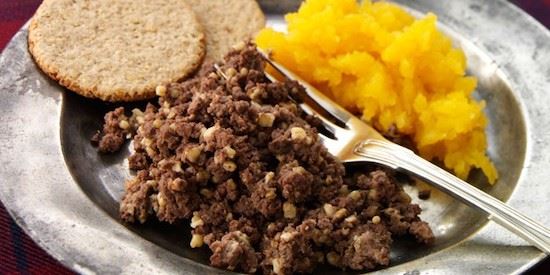Haggis is a well-known dish all throughout Scotland. I have been to Scotland several times and had heard of haggis previously but had never tried it primarily because I couldn't find it available anywhere near my home. On my first trip to Scotland, I decided to try it for myself.
According to Wikipedia.org at: https://en.wikipedia.org/wiki/Haggis:

Haggis (Scottish Gaelic: taigeis) is a savoury pudding containing sheep's pluck (heart, liver, and lungs), minced with onion, oatmeal, suet, spices, and salt, mixed with stock, and cooked while traditionally encased in the animal's stomach though now an artificial casing is often used instead. According to the 2001 English edition of the Larousse Gastronomique: "Although its description is not immediately appealing, haggis has an excellent nutty texture and delicious savoury flavour".
Yum!
From its reputation, I had assumed I would not like the taste of haggis. After trying a few bites, I found it was rather pleasant. I’m not going to eat haggis every day but I am willing to try it again someday. In fact, I have tried it again on each of my later trips to Scotland.
NOTE: I have since learned that haggis is available in the USA (and elsewhere) from Amazon at https://amzn.to/3aX9lGZ. In fact, Amazon also sells Haggis and Cracked Pepper Potato Crisps at the same address.
Later, I was shocked… yes, SHOCKED… to learn that haggis was not invented by the Scots. In fact, it first appeared in a cookbook published in England! Well, there goes another belief I held.
Historian Catherine Brown says a recipe for haggis was published in an English book almost two hundred years before any evidence of the dish was found in Scotland.
Catherine Brown said she found references to the dish inside a 1615 book called The English Hus-Wife. The title would pre-date by at least 171 years Robert Burns’ poem “To A Haggis,” which brought fame to the delicacy. The first mention she could find of Scottish haggis was in 1747.
NOTE: The English Hus-Wife may be found at: https://archive.org/details/b30333143
Ms. Brown reports, “It was popular in England until the middle of the 18th Century. Whatever happened in that period, the English decided they didn’t like it and the Scots decided they did.” That probably is because the ingredients of haggis were readily available to common folks in Scotland. Haggis has a reputation of being commonly-eaten by lower-class citizens of Scotland, not so much by the moneyed gentry.
You can read more at http://news.bbc.co.uk/2/hi/uk_news/8180791.stm.
Now somebody is going to tell me that kilts also were invented by the English. Oh, wait a minute… they were! See https://skilt.co.uk/2011/01/25/the-modern-kilt-was-invented-by-an-englishman/.